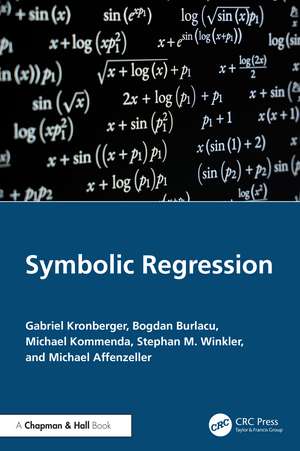Symbolic Regression
Autor Gabriel Kronberger, Bogdan Burlacu, Michael Kommenda, Stephan M. Winkler, Michael Affenzelleren Limba Engleză Hardback – 16 aug 2024
The basic idea of GP is to evolve a population of solution candidates in an iterative, generational manner, by repeated application of selection, crossover, mutation, and replacement, thus allowing the model structure, coefficients, and input variables to be searched simultaneously. Given that explainability and interpretability are key elements for integrating humans into the loop of learning in AI, increasing the capacity for data scientists to understand internal algorithmic processes and their resultant models has beneficial implications for the learning process as a whole.
This book represents a practical guide for industry professionals and students across a range of disciplines, particularly data science, engineering, and applied mathematics. Focused on state-of-the-art SR methods and providing ready-to-use recipes, this book is especially appealing to those working with empirical or semi-analytical models in science and engineering.
Preț: 599.69 lei
Preț vechi: 749.61 lei
-20% Nou
Puncte Express: 900
Preț estimativ în valută:
114.76€ • 119.09$ • 95.92£
114.76€ • 119.09$ • 95.92£
Carte tipărită la comandă
Livrare economică 17-31 martie
Preluare comenzi: 021 569.72.76
Specificații
ISBN-13: 9781138054813
ISBN-10: 113805481X
Pagini: 308
Ilustrații: 272
Dimensiuni: 156 x 234 mm
Greutate: 0.73 kg
Ediția:1
Editura: CRC Press
Colecția Chapman and Hall/CRC
Locul publicării:Boca Raton, United States
ISBN-10: 113805481X
Pagini: 308
Ilustrații: 272
Dimensiuni: 156 x 234 mm
Greutate: 0.73 kg
Ediția:1
Editura: CRC Press
Colecția Chapman and Hall/CRC
Locul publicării:Boca Raton, United States
Public țintă
Adult education, General, Professional Practice & Development, Professional Reference, and Undergraduate CoreCuprins
Contents
Preface
Symbols and Notation
1. Introduction
2. Basics of Supervised Learning
3. Basics of Symbolic Regression
4. Evolutionary Computation and Genetic Programming
5. Model Validation, Inspection, Simplification and Selection
6. Advanced Techniques
7. Examples and Applications
8. Conclusion
Appendix
Bibliography
Preface
Symbols and Notation
1. Introduction
2. Basics of Supervised Learning
3. Basics of Symbolic Regression
4. Evolutionary Computation and Genetic Programming
5. Model Validation, Inspection, Simplification and Selection
6. Advanced Techniques
7. Examples and Applications
8. Conclusion
Appendix
Bibliography
Notă biografică
The authors are all affiliated with the University of Applied Sciences (UAS) Upper Austria.
Gabriel Kronberger is professor for data engineering and business intelligence. His research interests are symbolic regression and machine learning as well as probabilistic graphical models.
Bogdan Burlacu is a research assistant. His main focus is the study of genetic programming evolutionary dynamics in symbolic regression scenarios.
Michael Kommenda is a research assistant. He has been applying symbolic regression methods in various industrial projects and application scenarios.
Stephan M. Winkler is professor for medical and bioinformatics and head of the bioinformatics research group. His research interests despite bioinformatics include genetic programming, nonlinear model identification and machine learning.
Michael Affenzeller is professor for heuristic optimization and machine learning and head of the Heuristic and Evolutionary Algorithms Laboratory. Furthermore, he is the vice dean for research and overall head of the COMET project for heuristic optimization in production and logistics (HOPL).
Gabriel Kronberger is professor for data engineering and business intelligence. His research interests are symbolic regression and machine learning as well as probabilistic graphical models.
Bogdan Burlacu is a research assistant. His main focus is the study of genetic programming evolutionary dynamics in symbolic regression scenarios.
Michael Kommenda is a research assistant. He has been applying symbolic regression methods in various industrial projects and application scenarios.
Stephan M. Winkler is professor for medical and bioinformatics and head of the bioinformatics research group. His research interests despite bioinformatics include genetic programming, nonlinear model identification and machine learning.
Michael Affenzeller is professor for heuristic optimization and machine learning and head of the Heuristic and Evolutionary Algorithms Laboratory. Furthermore, he is the vice dean for research and overall head of the COMET project for heuristic optimization in production and logistics (HOPL).
Descriere
Symbolic regression (SR) is one of the most powerful machine learning techniques that produces transparent models, searching the space of mathematical expressions for a model that represents the relationship between the predictors and the dependent variable without the need of taking assumptions about the model structure.
